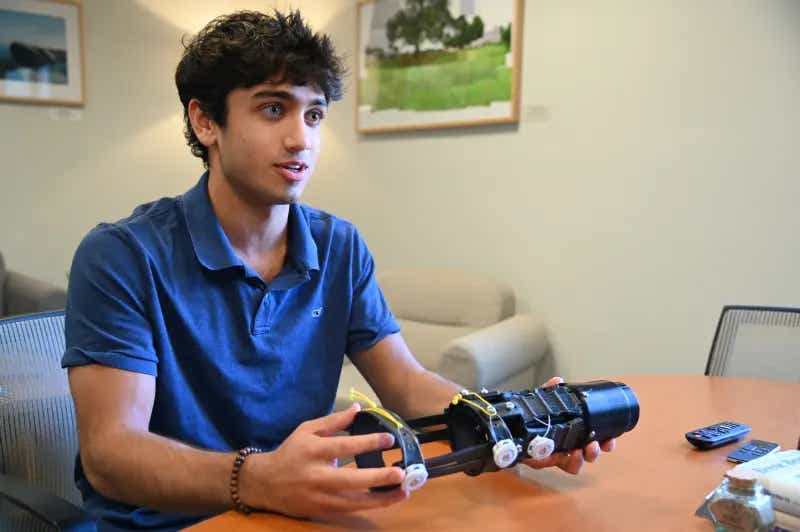High school student developed 3D-printed, accessible, prosthetics for amputees
Arav Bhargava is on a mission to revolutionize accessibility in prosthetics, offering life-changing opportunities to amputees worldwide.

Arav Bhargava is on a mission to revolutionize accessibility in prosthetics, offering life-changing opportunities to amputees worldwide. (CREDIT: Arav Bhargava)
Arav Bhargava, a senior student at SERC (Science and Engineering Research Center), is on a mission to revolutionize accessibility in prosthetics, envisioning a future where affordable, 3D-printed devices offer life-changing opportunities to amputees worldwide.
His journey began with a passion for assisting people with disabilities, fueled by his experiences coaching swimming for children with disabilities in the Arlington Adapted Aquatics Program. Bhargava, combining his interest in engineering with a desire to make a difference, delved into the realm of prosthetics.
Recognizing the need for innovation in this field, Bhargava sought guidance from prosthetic professionals to identify prevalent challenges. Chief among these was accessibility, prompting him to immerse himself in local organizations providing prosthetic fittings.
Bhargava sought guidance from prosthetic professionals to identify prevalent challenges. (CREDIT: Arav Bhargava)
Through shadowing and networking, he gained valuable insights, eventually launching a podcast, "The Prosthetic Experience," to raise awareness and share stories from prosthetic users, clinicians, and researchers.
Reflecting on his discoveries, Bhargava emphasized the profound impact of prosthetics on individuals' lives, both physically and emotionally.
He highlighted the evolving landscape of prosthetics, driven by rapid technological advancements and a shift towards bionics, offering amputees unprecedented capabilities.
Related Stories
Motivated by statistics revealing the staggering disparity in access to prosthetic services, particularly in developing countries, Bhargava set out to develop a solution.
With approximately 35-40 million people in need of orthotic and prosthetic services in such regions, yet only 5% having access, he recognized the urgent need for affordable and adjustable prosthetics.
His vision materialized in the form of a low-cost, 3D-printed, universal-fit prosthetic socket designed specifically for amputees in developing countries. By leveraging Potomac's tech resources and collaborating with prosthetic technicians, Bhargava iteratively refined his design, incorporating feedback and conducting rigorous testing to ensure functionality and comfort.
The resulting device, capable of accommodating different sizes and passing weight-bearing tests, offered a promising alternative to traditional prosthetics, at a fraction of the cost.
Bhargava's groundbreaking innovation earned him recognition as one of the Top 40 finalists in the Regeneron Science Talent Search 2024, an accolade bestowed upon scholars demonstrating exceptional creativity and leadership in scientific research.
His vision materialized in the form of a low-cost, 3D-printed, universal-fit prosthetic socket designed specifically for amputees in developing countries. (CREDIT: Creative Commons)
Selected from a pool of over 2,000 entrants, Bhargava's achievement reflects his dedication to addressing real-world challenges through innovative solutions.
As he prepares to compete in the Regeneron Finals Week competition in Washington, D.C., Bhargava remains committed to advancing accessibility in prosthetics, driven by a vision of empowering individuals with the tools to overcome physical limitations and embrace limitless possibilities.
For more science news stories check out our New Innovations section at The Brighter Side of News.
Note: Materials provided above by The Brighter Side of News. Content may be edited for style and length.
Like these kind of feel good stories? Get the Brighter Side of News' newsletter.



